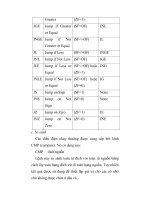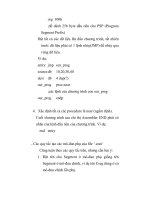Hệ chuyên gia: Nguyên tắc và Lập trình
Bạn đang xem bản rút gọn của tài liệu. Xem và tải ngay bản đầy đủ của tài liệu tại đây (532.03 KB, 69 trang )
Chapter 2:
The Representation of
Knowledge
Expert Systems: Principles and
Programming, Fourth Edition
Expert Systems: Principles and Programming, Fourth Edition 2
What is the study of logic?
•
Logic is the study of making inferences – given
a set of facts, we attempt to reach a true
conclusion.
•
An example of informal logic is a courtroom
setting where lawyers make a series of
inferences hoping to convince a jury / judge .
•
Formal logic (symbolic logic) is a more
rigorous approach to proving a conclusion to
be true / false.
Expert Systems: Principles and Programming, Fourth Edition 3
Why is Logic Important
•
We use logic in our everyday lives – “should I
buy this car”, “should I seek medical
attention”.
•
People are not very good at reasoning because
they often fail to separate word meanings with
the reasoning process itself.
•
Semantics refers to the meanings we give to
symbols.
Expert Systems: Principles and Programming, Fourth Edition 4
The Goal of Expert Systems
•
We need to be able to separate the actual
meanings of words with the reasoning process
itself.
•
We need to make inferences w/o relying on
semantics.
•
We need to reach valid conclusions based on
facts only.
Expert Systems: Principles and Programming, Fourth Edition 5
Knowledge vs. Expert Systems
•
Knowledge representation is key to the success
of expert systems.
•
Expert systems are designed for knowledge
representation based on rules of logic called
inferences.
•
Knowledge affects the development, efficiency,
speed, and maintenance of the system.
Expert Systems: Principles and Programming, Fourth Edition 6
Arguments in Logic
•
An argument refers to the formal way facts
and rules of inferences are used to reach valid
conclusions.
•
The process of reaching valid conclusions is
referred to as logical reasoning.
Expert Systems: Principles and Programming, Fourth Edition 7
How is Knowledge Used?
•
Knowledge has many meanings – data, facts,
information.
•
How do we use knowledge to reach
conclusions or solve problems?
•
Heuristics refers to using experience to solve
problems – using precedents.
•
Expert systems may have hundreds /
thousands of micro-precedents to refer to.
Expert Systems: Principles and Programming, Fourth Edition 8
Epistemology
•
Epistemology is the formal study of knowledge
.
•
Concerned with nature, structure, and origins
of knowledge.
Expert Systems: Principles and Programming, Fourth Edition 9
Categories of Epistemology
•
Philosophy
•
A priori
•
A posteriori
•
Procedural
•
Declarative
•
Tacit
Expert Systems: Principles and Programming, Fourth Edition 10
A Priori Knowledge
•
“That which precedes”
•
Independent of the senses
•
Universally true
•
Cannot be denied without contradiction
Expert Systems: Principles and Programming, Fourth Edition 11
A Posteriori Knowledge
•
“That which follows”
•
Derived from the senses
•
Now always reliable
•
Deniable on the basis of new knowledge w/o
the necessity of contradiction
Expert Systems: Principles and Programming, Fourth Edition 12
Procedural Knowledge
Knowing how to do something:
•
Fix a watch
•
Install a window
•
Brush your teeth
•
Ride a bicycle
Expert Systems: Principles and Programming, Fourth Edition 13
Declarative Knowledge
•
Knowledge that something is true or false
•
Usually associated with declarative statements
•
E.g., “Don’t touch that hot wire.”
Expert Systems: Principles and Programming, Fourth Edition 14
Tacit Knowledge
•
Unconscious knowledge
•
Cannot be expressed by language
•
E.g., knowing how to walk, breath, etc.
Expert Systems: Principles and Programming, Fourth Edition 15
Knowledge in Rule-Based
Systems
•
Knowledge is part of a hierarchy.
•
Knowledge refers to rules that are activated
by facts or other rules.
•
Activated rules produce new facts or
conclusions.
•
Conclusions are the end-product of inferences
when done according to formal rules.
Expert Systems: Principles and Programming, Fourth Edition 16
Expert Systems vs. Humans
•
Expert systems infer – reaching conclusions
as the end product of a chain of steps called
inferencing when done according to formal
rules.
•
Humans reason
Expert Systems: Principles and Programming, Fourth Edition 17
Expert Systems vs. ANS
•
ANS does not make inferences but searches
for underlying patterns.
•
Expert systems
o
Draw inferences using facts
o
Separate data from noise
o
Transform data into information
o
Transform information into knowledge
Expert Systems: Principles and Programming, Fourth Edition 18
Metaknowledge
•
Metaknowledge is knowledge about knowledge
and expertise.
•
Most successful expert systems are restricted to
as small a domain as possible.
•
In an expert system, an ontology is the
metaknowledge that describes everything
known about the problem domain.
•
Wisdom is the metaknowledge of determining
the best goals of life and how to obtain them.
Expert Systems: Principles and Programming, Fourth Edition 19
Figure 2.2 The Pyramid
of Knowledge
Expert Systems: Principles and Programming, Fourth Edition 20
Productions
A number of knowledge-representation
techniques have been devised:
•
Rules
•
Semantic nets
•
Frames
•
Scripts
•
Logic
•
Conceptual graphs
Expert Systems: Principles and Programming, Fourth Edition 21
Figure 2.3 Parse Tree
of a Sentence
Expert Systems: Principles and Programming, Fourth Edition 22
Semantic Nets
•
A classic representation technique for
propositional information
•
Propositions – a form of declarative
knowledge, stating facts (true/false)
•
Propositions are called “atoms” – cannot be
further subdivided.
•
Semantic nets consist of nodes (objects,
concepts, situations) and arcs (relationships
between them).
Expert Systems: Principles and Programming, Fourth Edition 23
Common Types of Links
•
IS-A – relates an instance or individual to a
generic class
•
A-KIND-OF – relates generic nodes to generic
nodes
Expert Systems: Principles and Programming, Fourth Edition 24
Figure 2.4 Two Types of Nets
Expert Systems: Principles and Programming, Fourth Edition 25
Figure 2.6: General Organization
of a PROLOG System









